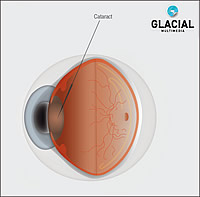
What Causes Cataracts?
 Cataracts are usually caused by the natural aging process and appear gradually over time. Occasionally, a cataract can develop rapidly, either in one eye or both. Although specifics are unknown, cataracts are believed to be caused by changes in the lens’ protein structures, either through aging, genes or external factors.
Cataracts are usually caused by the natural aging process and appear gradually over time. Occasionally, a cataract can develop rapidly, either in one eye or both. Although specifics are unknown, cataracts are believed to be caused by changes in the lens’ protein structures, either through aging, genes or external factors.
When Is It Necessary To Remove A cataract?
Cataracts are usually only treated when it significantly interferes with a patient’s vision and daily life. Once detected, visit your doctor regularly to monitor its status. Some cataracts never reach the stage where they need to be removed. However, if your cataract is interfering with your vision and completing daily tasks, then it is time to discuss cataract surgery with Dr. Mutyala.
Are Cataracts Only Found In Elderly People?
No. Cataracts are most commonly found in elderly people since it can be part of the natural aging process.
However, in rare cases, infants may develop congenital cataracts, as a result of hereditary enzyme defects, generic diseases or a congenital infection. Also, if the mother had an illness while pregnant such as German measles, chickenpox, or another infectious disease, it is also possible a child will have cataracts early on.
Additional factors such as exposure to excessive UV rays, radiation, diabetes, smoking, or use of certain medications could also lead to early development of cataracts.
Significant eye trauma, eye surgeries or intraocular inflammation may also contribute to development of cataracts.
What Are Symptoms Of Cataracts?
Cataract sufferers often equate their vision with looking through dirty glasses. Cataract sufferers often complain of:
- Blurred Vision
- Continued Changes in Corrective Lens Prescriptions
- Decreased Vision
- Double Vision
- Loss of Color Vision
- Nearsightedness
- Night Glare or Sun Glare
Is Cataract Surgery Serious?
Every surgery is serious and has its risk; however, cataract surgery is the most commonly performed surgery in the United States with close to 2.5 million patients having surgery annually. Cataract surgery is performed on an outpatient basis and usually takes just a few hours from start to finish. Choosing a surgeon with experience will reduce the risk of something going wrong.
What Happens During Cataract Surgery?
Our doctor will treat your eye with a local anesthetic to alleviate discomfort. A tiny incision is made through which a microscopic instrument will enter. The surgeon will then either remove the lens, or use ultrasound, a laser or surgical solution to break the cataract up into small enough pieces to be washed away or removed.
Once the cataract is removed, a replacement lens (IntraOcular Lens Implant-IOL) can be inserted through the same incision.
After the procedure, the patient will rest for a few hours at the surgery center prior to going home. The surgeon may prescribe eye drops or a protective shield to wear at night in order to prevent rubbing your eyes at night. A follow-up visit may be scheduled. Most patients return to normal activities within a few days after surgery.
Does Cataract Surgery Hurt?
Cataract surgery should not hurt, but will cause discomfort. Numbing drops and medications will be used to help alleviate pain.
What Are Possible Side Effects Of Cataract Surgery?
As with any surgery, there is always a possibility of side effects. Side effects are uncommon with cataract surgery, but may include displacement of the lens implant, floaters, halos, glare in your vision, excessive pain, infection, swelling of the cornea, glaucoma, bleeding are possible. Retinal detachment may also occur in rare situations. Contact your doctor immediately if you experience excessive pain, nausea, or vision loss after cataract surgery. Be sure to consider the potential risks and benefits of this surgery prior to having cataract surgery.
Are Lasers Involved In Cataract Surgery?
YES. Lasers can be used to remove cataracts. This is the most advanced way to perform this procedure. Make an appointment to see if you qualify in using the latest technology.
Will I Need Glasses After Cataract Surgery?
It depends on what kind of lens is implanted and your prescription prior to the surgery. Patients who choose the advanced multifocal or accommodative should not need glasses for most activities. Patients who choose to have a mono-focal lenses implanted may still need glasses especially for reading and close tasks.
When May I Resume Normal Activities?
Every patient recovers at their own pace, however most patients resume normal activities like reading and watching television the next day, and return to work within two to seven days. It is not advisable to participate in any strenuous activity for at least two weeks. Ask Dr. Mutyala what is best for you.
Schedule your appointment to check your eyes for cataracts with Pannu Laser & Vision Institute today! Call 954-484-0700 to schedule your appointment..




